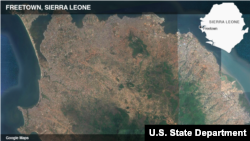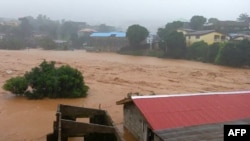At least 300 people are now confirmed dead a day after Freetown, the capital of Sierra Leone, was buried under a mudslide and heavy flooding. Officials say the death toll is likely to rise.
The catastrophe early Monday followed hours of heavy rain. Witnesses described a particularly hard hit area in Regent, saying roads became "churning rivers of mud." At least 2,000 people have been left homeless as a result of the disaster.
Relatives dug through the mud in search of their loved ones while military personnel were deployed to help with the rescue operation.
Photos and video posted by local residents showed people chest deep in mud trying to traverse the roads.
A spokesman for the Red Cross told the French News Agency that the group had accounted for at least 312 dead.
Officials estimate several thousand people have been left homeless.
State television halted regular programming and showed scenes of people carrying loved ones' remains in rice sacks to morgues, while others were seen digging through the mud in search of missing family members.
Vice President Victor Foh, who came to the Regent area, told Reuters, "It is likely that hundreds are lying dead underneath the rubble." He said a number of illegal buildings were constructed in the area.
"The disaster is so serious that I myself feel broken," he said. "We're trying to cordon (off) the area (and) evacuate the people."
U.N. Secretary-General Antonio Guterres said he was "saddened by the deaths and devastation" and offered his condolences to those who suffered loss.
Some impoverished areas in Sierra Leone's capital are near sea level and have poor drainage systems, which increases flooding during rainy season. Freetown is often hit by heavy rain and flooding for several months a year, which increases the risk of waterborne diseases such as cholera.
Sierra Leone was one of several West African nations hit by an outbreak of the Ebola virus in 2014. The epidemic left more than 4,000 people dead and greatly affected the country's economy, which is still trying to recover.
ice President Victor Foh, who came to the Regent area, told Reuters, "It is likely that hundreds are lying dead underneath the rubble." He said a number of illegal buildings were constructed in the area.
"The disaster is so serious that I myself feel broken," he said. "We're trying to cordon (off) the area (and) evacuate the people."
U.N. Secretary-General Antonio Guterres said he was "saddened by the deaths and devastation" and offered his condolences to those who suffered loss.
Some impoverished areas in Sierra Leone's capital are near sea level and have poor drainage systems, which increases flooding during rainy season. Freetown is often hit by heavy rain and flooding for several months a year, which increases the risk of waterborne diseases such as cholera.
Sierra Leone was one of several West African nations hit by an outbreak of the Ebola virus in 2014. The epidemic left more than 4,000 people dead and greatly affected the country's economy, which is still trying to recover.







